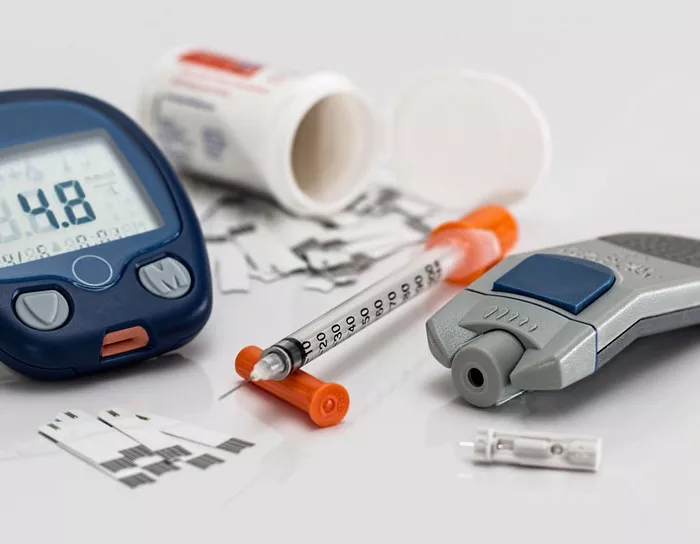Type 2 diabetes is a chronic metabolic disorder characterized by high blood glucose levels resulting from insulin resistance and impaired insulin secretion. It is a common condition that affects millions of people worldwide and poses significant health risks if not properly managed. Understanding the impact of type 2 diabetes on the body is crucial for effective management and prevention of complications. This article provides a comprehensive overview of how type 2 diabetes affects various systems and organs in the body.
Pathophysiology of Type 2 Diabetes
To understand the effects of type 2 diabetes on the body, it’s essential to first grasp its underlying mechanisms. Type 2 diabetes develops primarily due to:
Insulin Resistance
Insulin resistance occurs when the body’s cells become less responsive to insulin, a hormone produced by the pancreas that helps regulate blood glucose levels. As a result, glucose cannot enter the cells efficiently, leading to elevated blood sugar levels.
Impaired Insulin Secretion
In addition to insulin resistance, the pancreas may not produce sufficient insulin to overcome the resistance. This combined effect results in high blood glucose levels.
Increased Gluconeogenesis
The liver may produce more glucose than necessary, further exacerbating high blood sugar levels. This process, known as gluconeogenesis, contributes to the persistence of hyperglycemia.
Effects of Type 2 Diabetes on the Body
Type 2 diabetes can affect nearly every system in the body. The following sections detail how this condition impacts various organs and functions.
Cardiovascular System
Type 2 diabetes significantly increases the risk of cardiovascular disease, including heart disease, stroke, and hypertension.
Atherosclerosis
Chronic high blood glucose levels contribute to the development of atherosclerosis, a condition where plaques build up in the arteries, leading to reduced blood flow and increased risk of heart attack and stroke.
Hypertension
Diabetes often coexists with high blood pressure, which can further damage blood vessels and increase cardiovascular risk.
Heart Failure
Long-term diabetes can lead to heart failure due to damage to the heart muscle and blood vessels, making it harder for the heart to pump blood effectively.
Nervous System
The nervous system is vulnerable to damage from prolonged high blood glucose levels, leading to diabetic neuropathy and other complications.
Peripheral Neuropathy
Diabetic peripheral neuropathy is a common complication characterized by damage to the peripheral nerves, causing symptoms like pain, tingling, and numbness in the extremities.
Autonomic Neuropathy
Autonomic neuropathy affects the nerves that control involuntary bodily functions, such as heart rate, digestion, and blood pressure. This can lead to issues like digestive problems, altered heart rate, and bladder dysfunction.
Cognitive Impairment
There is evidence suggesting that type 2 diabetes may be associated with cognitive decline and an increased risk of dementia.
Renal System
Type 2 diabetes can have severe effects on the kidneys, leading to diabetic nephropathy.
Chronic Kidney Disease (CKD)
Diabetic nephropathy is a leading cause of chronic kidney disease. Elevated blood glucose levels damage the blood vessels in the kidneys, impairing their ability to filter waste from the blood effectively.
End-Stage Renal Disease (ESRD)
In severe cases, diabetic nephropathy can progress to end-stage renal disease, requiring dialysis or a kidney transplant to manage kidney function.
Eyes
Diabetes can lead to various eye problems, collectively known as diabetic eye disease.
Diabetic Retinopathy
High blood glucose levels can damage the blood vessels in the retina, leading to diabetic retinopathy. This condition can cause vision loss and blindness if not managed effectively.
Cataracts
People with diabetes are at an increased risk of developing cataracts, a condition where the lens of the eye becomes cloudy, impairing vision.
Glaucoma
Diabetes also increases the risk of glaucoma, a condition characterized by increased pressure within the eye that can damage the optic nerve and lead to vision loss.
Skin
Diabetes can affect the skin in various ways, leading to complications such as infections and skin changes.
Infections
People with diabetes are more prone to skin infections, including bacterial and fungal infections, due to impaired immune function and high blood glucose levels.
Diabetic Dermopathy
Diabetic dermopathy is a condition characterized by light brown, scaly patches on the skin, often seen on the lower legs of individuals with diabetes.
Acanthosis Nigricans
Acanthosis nigricans is a skin condition marked by dark, velvety patches, usually found in body folds and creases, often associated with insulin resistance.
Gastrointestinal System
Type 2 diabetes can impact the gastrointestinal system, affecting digestion and nutrient absorption.
Gastroparesis
Gastroparesis is a condition where the stomach takes too long to empty its contents due to impaired nerve function. This can lead to nausea, vomiting, and bloating.
Altered Nutrient Absorption
Diabetes can affect the absorption of nutrients in the gastrointestinal tract, leading to deficiencies and gastrointestinal discomfort.
Musculoskeletal System
Type 2 diabetes can influence the musculoskeletal system, leading to complications such as joint problems and altered bone health.
Osteoporosis
Diabetes is associated with an increased risk of osteoporosis, a condition characterized by weakened bones and an increased risk of fractures.
Joint Problems
Diabetes can contribute to joint problems, such as limited joint mobility and stiffness, which can affect physical function and quality of life.
Reproductive System
Type 2 diabetes can have implications for both male and female reproductive health.
Sexual Dysfunction
Diabetes can lead to sexual dysfunction in both men and women. In men, it can cause erectile dysfunction, while women may experience reduced sexual desire or arousal.
Pregnancy Complications
For women with diabetes, pregnancy can be complicated by gestational diabetes, preeclampsia, and other issues that can affect both the mother and the baby.
Managing the Impact of Type 2 Diabetes
Effective management of type 2 diabetes is crucial for minimizing its impact on the body and preventing complications.
Blood Glucose Control
Maintaining optimal blood glucose levels is essential for preventing complications and managing the condition effectively.
Medication Management: Adhering to prescribed medications, including insulin and oral hypoglycemic agents, is crucial for blood glucose control.
Lifestyle Changes: Implementing lifestyle changes, such as a balanced diet, regular exercise, and weight management, can help regulate blood glucose levels.
Regular Monitoring
Regular monitoring of blood glucose levels, blood pressure, and other relevant health indicators is essential for managing diabetes and detecting complications early.
Self-Monitoring: Using glucose meters or continuous glucose monitors to track blood glucose levels can help manage the condition effectively.
Routine Check-Ups: Regular visits to healthcare providers for comprehensive evaluations can help monitor and manage complications.
Managing Complications
Addressing complications associated with type 2 diabetes involves targeted treatment and lifestyle modifications.
Cardiovascular Health: Managing blood pressure, cholesterol levels, and maintaining a heart-healthy lifestyle can reduce cardiovascular risk.
Renal Health: Monitoring kidney function and managing blood glucose levels can help prevent or slow the progression of diabetic nephropathy.
Eye Care: Regular eye examinations and managing blood glucose levels can help prevent or manage diabetic eye disease.
Education and Support
Education and support play a vital role in managing type 2 diabetes effectively.
Patient Education: Educating individuals about diabetes management, including diet, exercise, and medication adherence, is crucial for effective self-care.
Support Networks: Engaging with support networks, including healthcare providers, diabetes educators, and support groups, can provide valuable resources and encouragement.
See also: What Is the Best Exercise for Type 1 Diabetes?
Conclusion
Type 2 diabetes is a multifaceted condition that affects virtually every system in the body. From cardiovascular and renal complications to impacts on the nervous system, eyes, skin, and beyond, the effects of type 2 diabetes are wide-ranging and significant. Effective management involves maintaining optimal blood glucose levels, regular monitoring, addressing complications, and utilizing education and support resources. By understanding the impact of type 2 diabetes on the body, individuals can take proactive steps to manage their condition, prevent complications, and improve their overall quality of life.
Related topics:
What is the Most Common Cause of Hypoglycemia?


























